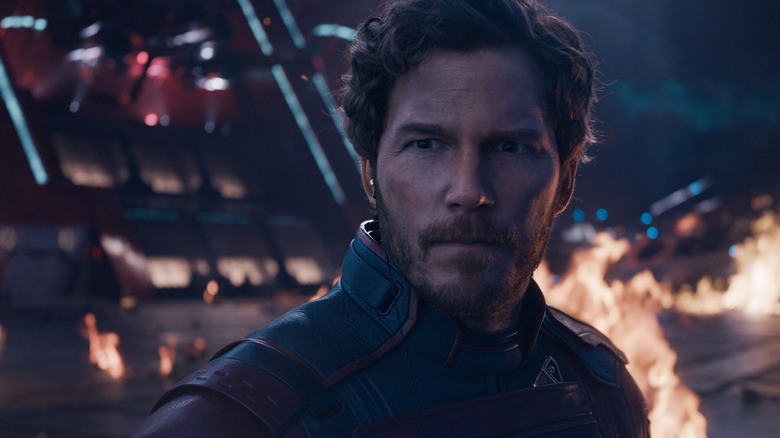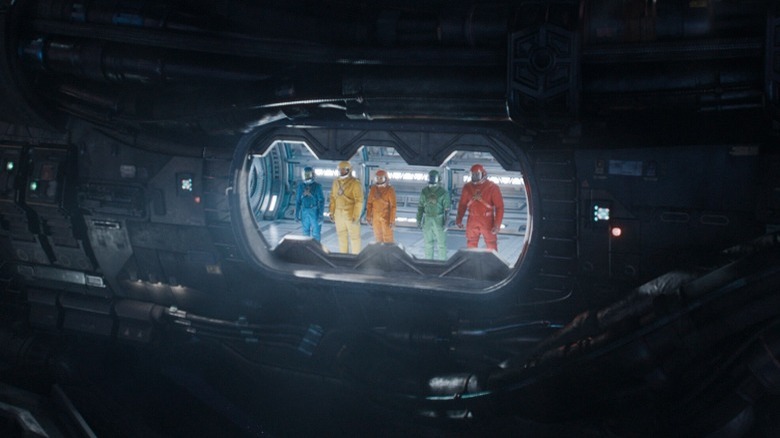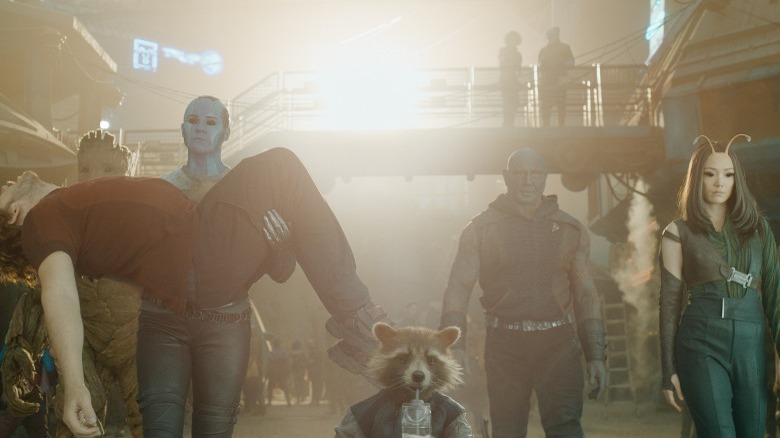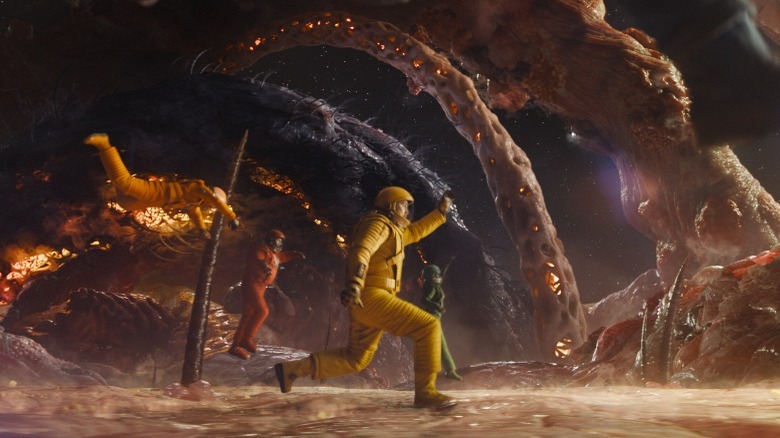Guardians Of The Galaxy 3's Score Used 'Instruments' From A Hardware Store
With "Guardians of the Galaxy Vol. 3," astute listeners might have noticed the score featured some slightly different touches than the previous two films in the series. The music got a little spacier, a little weirder, a little sadder, and a lot of that could be owed to composer John Murphy, who was relatively new to the series. His first work on the "Guardians" series wasn't in one of their theatrical appearances but in the 2022 Disney+ special.
The score might not be the first thing that comes to mind with "Guardians of the Galaxy." Because of how frequent they are, some viewers might only note the eclectic classic rock needle drops in the series. But the work across the first two movies from composer Tyler Bates gave the series a slick and orchestral score befitting its outcast characters and their off-beat adventures. Bates consistently worked with writer and director James Gunn from his feature directorial debut "Slither" on to "Vol. 2."
According to Film Music Reporter, that all changed when Gunn began working on 2021's "The Suicide Squad," and Bates departed from it. That opened up a new potential collaboration, and for a filmmaker like Gunn who is especially particular about the mind of music that he uses from scene to scene, the composer would need to be the right pick. And John Murphy was.
Since "The Suicide Squad," Murphy has been Gunn's go-to composer, and he brought the same mix of strange invention and technical brilliance to the series that its director has. In fact, he took some odd turns for "Vol. 3," including using the sounds of a hardware store's tools to bolster the score.
The man with the music
While he was scoring "The Suicide Squad," John Murphy became close to writer-director James Gunn, sharing a love of music and a common punk-rock background that became the basis of their working relationship. As he told The Flickering Myth, "It was like working on an indie movie," despite it being a big-budget superhero flick. Shortly afterward, "James just rang me up one night and said, 'Look, I want you to do the next "Guardians" film,'" Murphy recalled.
One thing Gunn liked doing with the first two films in the series, scored by Tyler Bates, is playing the score on-set. As a writer-director, he incorporates needle drops into the screenplay, often in search of the greatest emotional impact (even to the point of making the musical artists whose work is being used cry). The score is no different, and Murphy was up to the challenge of crafting memorable and emotional themes perfect for the out-there cosmic landscapes of the movie.
With "Vol. 3," Murphy crafted tracks like "Naming" which deftly balanced the sweetness of the scene, where Rocket (Bradley Cooper) and his captive animal buddies come up with names for themselves, with the harsher reality underneath it. He incorporated Henry Purcell's "Dido's Lament," and "Into The Light" provided the backdrop to one of the series' most emotional scenes. He even gave the mostly-wasted Adam Warlock (Will Poulter) of the movie a killer musical introduction.
But one of the most impressive things he might have done is incorporate new kinds of musical instruments in the score, with a few tracks abandoning the traditional instrumentation that has become the Marvel standard.
Different tones
"James [Gunn] made it clear that the music has to be very different for this," composer John Murphy told The Flickering Myth about composing the score for "Guardians of the Galaxy Vol. 3." "We still have our big Marvel action moments and those things, but ... it was going to be very dark and very violent in a lot of the film." That led to some necessary changes from the great groundwork laid by Tyler Bates in the previous two films.
Besides providing a great deal of rawer, more emotional music for the scenes focusing on the tragic backstory of Rocket, Murphy began to grow excited at the prospect of making a movie set in space, and what that could mean for the expanses of the score. In particular, he began thinking about the kinds of sounds that could carry the movie's "otherworldly" tone, to work in concert with Gunn's vision. As he mentioned, the bold Cliff Martinez score for Steven Soderbergh's 2002 "Solaris" became an inspiration in terms of finding new sounds.
So he got creative. It was a movie that required a massive amount of work from all of its artists (especially in the design of the Humanimals), and Murphy responded in kind. As a self-taught composer who made at least one soundtrack too "weird" to actually go on the movie he made it for (released in 2014 as "Anonymous Rejected Filmscore"), this could be doable.
As Murphy began working on the score, he realized he would be able to create its unconventional beauty with a bit of DIY handiwork. True to the James Gunn "indie movie with a big budget" ethos.
Picking up hardware
It started, John Murphy told The Flickering Myth, with getting UFO-shaped tongue drums from a man named Boris. From there, he tested them through a fuzz pedal, a process that he has used numerous times as a guitarist by trade. From there, he realized the sound he was getting was pretty incredible, and became one of the foundations of the score.
But that wasn't enough for the Orgoscope sequence of the film, in which the Guardians infiltrate an enemy space station that is made up of living matter, a true mix of metallic and organic. While Murphy could have given the space station some obvious choices, with metal-sounding drums, he opted instead to use fuzz pedals again, only not with the tongue drum inputs. His producer, Tyler Barton, had the idea of going to a hardware store and picking up random pieces, hoping that maybe something would be able to help with the Orgoscope music.
"I think the best percussion sound in the whole movie was a metal immersion heater tray," Murphy said, talking about how, once you hit it with metal and record it, you get an "incredible" sound. He also picked up a marvin, which he compared to a medieval torture instrument, just for the score.
James Gunn thinks that "Vol. 3" is the best of the series, and he might be right. The movie represents the artistic heights that Marvel movies can reach when storytellers are given freedom, and John Murphy's brilliant, wild score is just one part of that.



